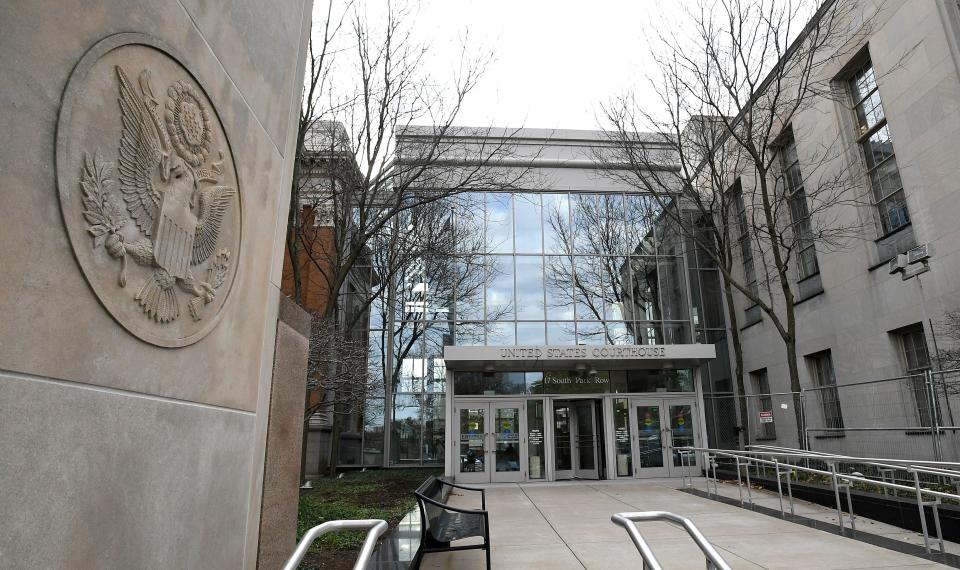Erie federal judge's ruling on mail-in ballots could shape outcome of 2024 election
- Oops!Something went wrong.Please try again later.
U.S. District Judge Susan Paradise Baxter is best known for presiding over cases that originate in northwestern Pennsylvania, particularly the city of Erie.
The fraud case against the Erie-based Hertel & Brown Physical & Aquatic Therapy and the racketeering case against the Erie gang 4-Nation are among the most high-profile matters on Baxter's docket at the federal courthouse on Perry Square in downtown Erie.
But Baxter also sometimes deals with cases with broader implications.
In one of the most wide-reaching cases she has handled in her five years as a federal district judge, Baxter on Tuesday released a precedent-setting ruling that affects voters throughout Pennsylvania.
Baxter ruled that, in Pennsylvania, mail-in ballots without accurate dates handwritten on their exterior envelopes must still be counted if they are received in time. Excluding those ballots would violate federal civil rights law, Baxter ruled.

Her decision, if upheld on appeal, means that fewer mail-in ballots would be invalidated in Pennsylvania, a swing state considered pivotal in the outcome of the 2024 presidential election.
Advocates of voting rights praised the decision.
"This is a tremendous victory for mail-in voters in Pennsylvania," Philip Hensley-Robin, executive director of Common Cause Pennsylvania, one of the plaintiffs in the case, said in a statement. "We are relieved that minor clerical errors will no longer prevent Pennsylvanians from having their votes counted. We look forward to seeing the impact that this ruling will have on future elections, particularly for communities of color and elderly Pennsylvanians."
Baxter's ruling concerned Civil Rights Act of 1964
In a 77-page opinion that garnered extensive national media coverage, Baxter found that throwing out mail-in ballots due to dating issue violates the Materiality Provision of the U.S. Civil Rights Act of 1964.
"The provision protects a citizen's right to vote by forbidding a state actor from disqualifying a voter because of their failure to provide or error in providing some unnecessary information on a voting application or ballot," Baxter wrote.
She found that elections officials do not use the date on the outer envelope to determine whether the vote should be counted. Among other things, Baxter noted that county election officials know when a mail-in ballot is returned by scanning a barcode on the return envelope.
“The important date for casting the ballot is the date the ballot is received," Baxter wrote. "Here, the date on the outside envelope was not used by any of the county boards to determine when a voter's mail ballot was received in the November 2022 election."

In that election, more than 7,600 mail ballots in 12 counties were tossed because the outer envelope lacked a date or had an incorrect date, according to the decision. Those 12 counties ended up being defendants in the case.
Erie County was not listed among the 12 counties, but Erie County election officials in November 2022 set aside at least 240 mail-in and absentee ballots that were enclosed in undated or incorrectly dated outer envelopes.
In addition, the Pennsylvania Department of State has said the state court decision to bar mail-in ballots without accurate handwritten dates resulted in otherwise valid votes being thrown out. The agency said more than 16,000 mail-in ballots in the 2022 midterm election were disqualified by county officials because they lacked secrecy envelopes or proper signatures or dates.
Democratic voters made up more than two-thirds of the total canceled ballots.
ACLU represented the plaintiffs as RNC opposed them
In the case before Baxter, the plaintiffs, in addition to Common Cause, included the Pennsylvania State Conference of the NAACP and the League of Women Voters of Pennsylvania. Lawyers with the American Civil Liberties Union represented the plaintiffs.
"Every eligible person who casts a ballot should have their vote counted," Witold Walczak, legal director of the ACLU of Pennsylvania, said in a statement on Baxter's ruling. "The handwritten-date requirement is completely irrelevant and unnecessary because elections officials know whether the ballot was received on time. And the whole point of this provision in the Civil Rights Act was to stop states from disqualifying votes for frivolous reasons, like this date requirement. We’re grateful that the court understood that.”
The Republican National Committee intervened in the case and argued that the ballots were legally tossed. The RNC said Pennsylvania's date requirement for the mail-in ballots does not violate the Materiality Provision of the Civil Rights Act of 1964, according to Baxter's decision.
The RNC's lead lawyer in the case did not immediately respond to a request for comment.
Pennsylvania Supreme Court ruling spurred suit
The plaintiffs sued on Nov. 4, 2022. They named as defendants Acting Pennsylvania Secretary of State Leigh M. Chapman and the board of elections in all of Pennsylvania's 67 counties.
The plaintiffs asked Baxter to issue an injunction that would bar the counties from rejecting mail-in ballots "based solely on a missing or incorrect date on the return envelope," according to the suit.
The request for the injunction came in response to decisions from the Pennsylvania Supreme Court on Nov. 1, 2022. The justices unanimously ruled that Pennsylvania counties must segregate and not count mail-in ballots with missing or incorrect dates.
But the court — then down one seat due to the death of Chief Justice Max Baer in September 2022 — deadlocked 3-3 on whether envelope dates, mandatory under state law, would violate the Materiality Provision of the U.S. Civil Rights Act of 1964.
The state Supreme Court's inability to decide the issue concerning the Materiality Provision opened up the possibility that a federal judge would end up deciding the dispute. Baxter ended up being that judge, though her ruling could be be appealed to the 3rd U.S. Circuit Court of Appeals, based in Philadelphia, or to the U.S. Supreme Court.
Baxter had guidance as she considered the lawsuit. The 3rd U.S. Circuit Court of Appeals ruled in May 2022 that the dates in question aren't mandatory, but the U.S. Supreme Court in October 2022 deemed that decision moot, leading to the litigation in U.S. District Court in Erie.
How did a federal judge in Erie get the case?
The NAACP and other plaintiffs said Baxter had jurisdiction because seven of the boards of elections named in the suit were in counties that fall under the jurisdiction of the Erie Division of U.S. District Court for the Western District of Pennsylvania, based in Pittsburgh. The seven counties in the Erie Division are Erie, Crawford, Elk, Forest, McKean, Venango and Warren.
Baxter, 67, was confirmed as a U.S. District judge in 2018 with support from Republicans and Democrats. She had served as a federal magistrate judge — the position below district judge — for more than 23 years.

President Barack Obama first nominated Baxter to the post of district judge in July 2015, but that nomination languished without a vote by the Senate and expired in January 2017 with the adjournment of the 114th Congress.
President Donald Trump in December 2017 renominated Baxter to the post of U.S. district judge in the Western District of Pennsylvania, to be seated in Erie. The Senate confirmed her in August 2018.
Baxter assigned the case: Federal judge in Erie to decide whether Pa. undated mail-in ballots can be counted
The Associated Press and Spotlight PA contributed to this report.
Contact Ed Palattella at epalattella@timesnews.com. Follow him on X @ETNpalattella.
This article originally appeared on Erie Times-News: Erie federal judge's ruling could influence 2024 election. Here's how

